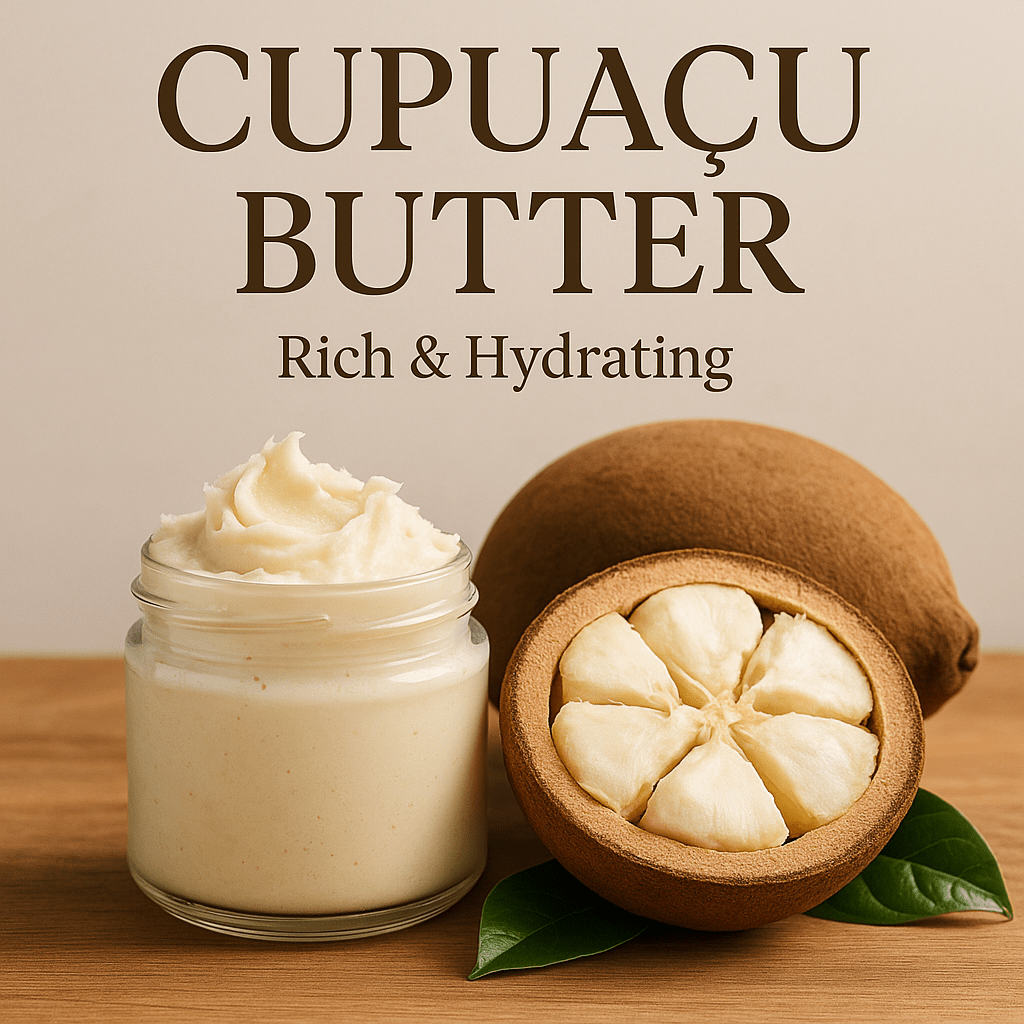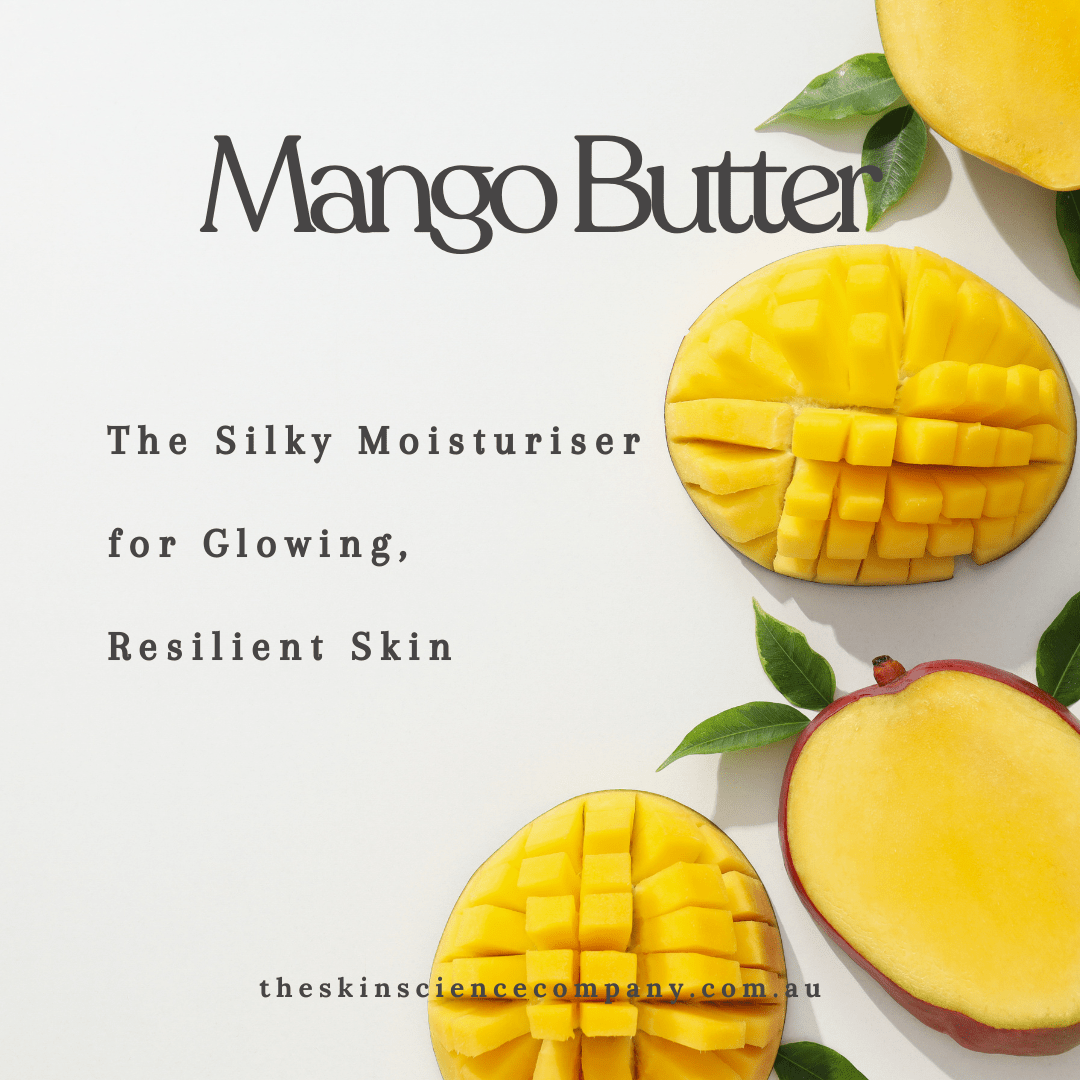If you’ve been searching for a deeply hydrating yet lightweight alternative to cocoa or shea butter, Cupuacu Butter (Pronounced koo-poo-wah-soo) might just become your next skincare essential. Revered in Brazilian beauty rituals and steadily gaining global popularity, Cupuacu butter offers an exceptional ability to attract and hold moisture—making it especially valuable for dry, sensitive, or aging skin types.
What Is Cupuacu Butter?
Cupuacu butter is a plant-based emollient extracted from the seeds of the Theobroma grandiflorum tree, which grows abundantly in the Amazon. Its creamy, soft texture melts easily upon skin contact, making it ideal for skincare and haircare applications.
Unlike cocoa butter, which is firmer and slower to absorb, cupuacu is known for its lightweight feel and fast absorption. It contains a rich profile of fatty acids—including linoleic, oleic, and stearic acids—as well as phytosterols that help restore skin elasticity and barrier function.
What Is Cupuacu Butter Good For?
One of the most common questions people ask is: "What is cupuacu butter good for?" The answer: hydration, barrier repair, and softness.
Whether you're formulating a whipped body butter or enhancing a facial balm, Cupuacu offers unique advantages:
-
Intense moisture retention (even more than lanolin)
-
Softens rough, flaky skin without greasiness
-
Soothes inflammation and calms dry, irritated skin
-
Supports elasticity—making it useful in anti-aging skincare
-
Reduces trans-epidermal water loss, which is key for sensitive and mature skin
Some users even ask, "Which butter is best for glowing skin?" Cupuacu is a standout for this purpose—its ability to plump and hydrate the skin results in a visibly smoother and more radiant appearance.
Is Cupuacu Butter Better Than Cocoa or Shea Butter?
If you’ve been comparing cupuacu butter vs shea butter or cupuacu vs cocoa butter, the distinction lies in their feel and hydration levels.
-
Cupuacu vs Shea: Shea butter is rich and slightly heavier. Cupuacu provides similar nourishment but with a lighter finish—great for daytime use or humid climates.
-
Cupuacu vs Cocoa: Cocoa butter is thicker and more occlusive. Cupuacu melts faster and absorbs quickly, making it ideal for facial use or leave-in hair care.
Plus, cupuacu butter doesn’t carry the same comedogenic risk. Many wonder, "Does Cupuacu Butter clog pores?" or "Is Cupuacu Butter pore-clogging?" Thankfully, it has a low comedogenic rating and is typically non-comedogenic, making it safe for most skin types—even those prone to congestion.
Can You Use Cupuacu Butter on Your Face?
Yes—Cupuacu is gentle enough for the face, especially when blended into moisturizers or serums. Its natural composition is similar to our skin’s lipid layer, which makes it excellent for hydrating without clogging pores. For dry or mature skin, it works beautifully to reduce tightness, flakiness, and rough patches.
Some even ask if Cupuacu is good for low porosity hair or as a face mask ingredient. It performs well in both cases due to its softening and sealing abilities without the greasy weight.
Cupuacu Butter for Hair and Lips
While this butter is most often associated with skin hydration, Cupuacu butter benefits for hair are increasingly being recognized. It helps tame frizz, lock in moisture, and prevent breakage—especially for curls or chemically treated hair. Its softness also makes it ideal for DIY hair masks or as a natural leave-in.
On the lips, Cupuacu excels in moisture retention, making it a superior alternative to petroleum-based balms.
Try blending it with mango or shea butter for a naturally nourishing lip balm or body butter.
Common Questions—Answered Naturally
Many curious users search:
-
“Is Cupuacu Butter good for acne?”
It’s rich in anti-inflammatory compounds, and due to its low comedogenic profile, it's often well-tolerated by acne-prone skin. -
“Is Cupuacu Butter a nut?”
It comes from a seed, not a tree nut—but if you have sensitivities, we still recommend a patch test. -
“Does it work better than cocoa butter?”
For hydration and absorption, yes. It draws water into the skin more efficiently. -
“What’s the best butter for anti-aging?”
Cupuacu butter is a contender due to its plumping effect and high antioxidant content.
Formulation Ideas
If you’re into DIY skincare, try these ideas:
Hydrating Night Balm
-
1 tsp cupuacu butter
-
2 drops rosehip oil
-
1 drop lavender essential oil (optional)
Melt together and apply to damp skin before bed for overnight repair.
Hair Smoothing Butter
-
1 tbsp cupuacu butter
-
1 tsp jojoba oil
-
Apply to ends of hair and leave on for 20–30 minutes before washing
Where to Find It
You can shop our premium Cupuacu Butter here, perfect for skincare enthusiasts, formulators, or those simply wanting better hydration.
Want to explore more powerful plant-based ingredients? Visit our full Ingredient Library for oils, butters, and actives you can trust.
Final Thoughts
Cupuacu Butter is more than a skincare trend—it’s a functional, luxurious ingredient that genuinely improves skin and hair health. With superior hydration, a smooth texture, and minimal risk of clogging pores, it outperforms many mainstream options.
Whether you're making your own balm, looking for a body butter that works in winter, or seeking a facial moisturizer that hydrates without heaviness—Cupuacu deserves a permanent spot in your skincare routine.
Let your skin drink in the benefits.
Shop now and discover the Amazonian secret to resilient, glowing skin.



